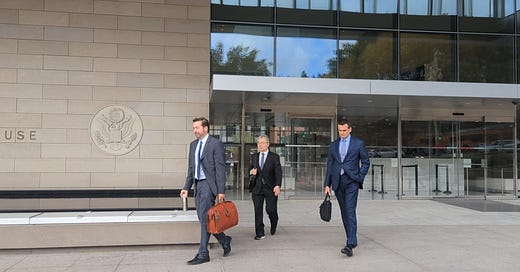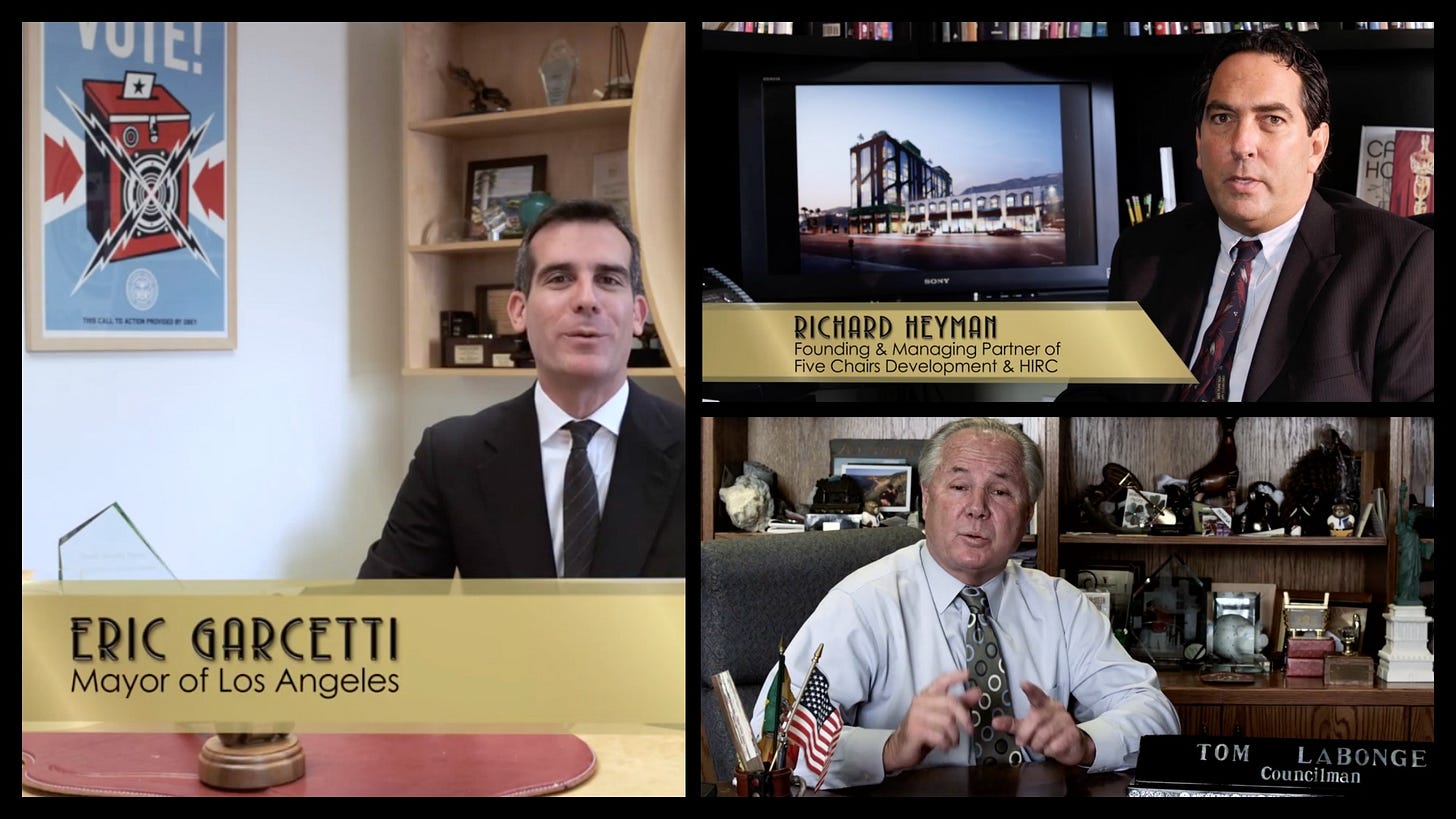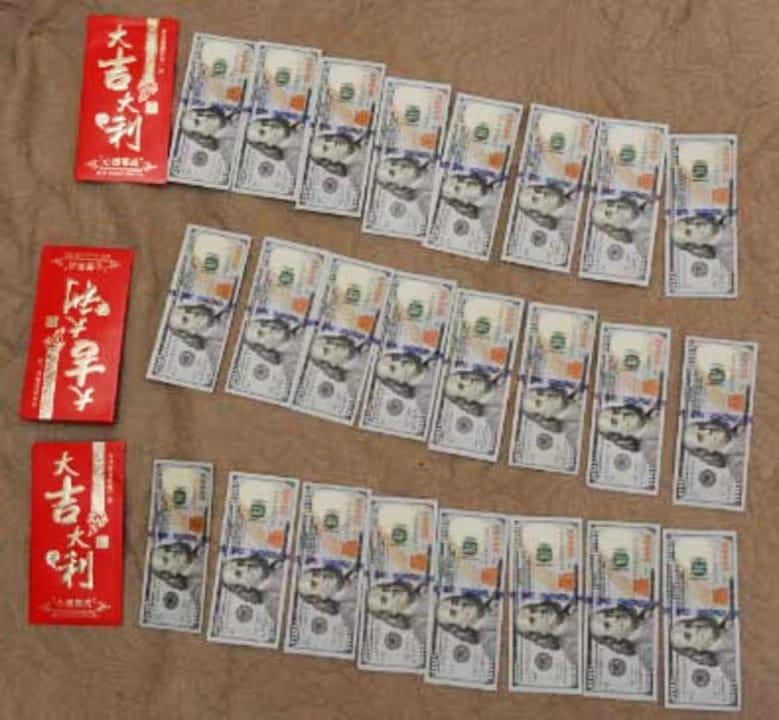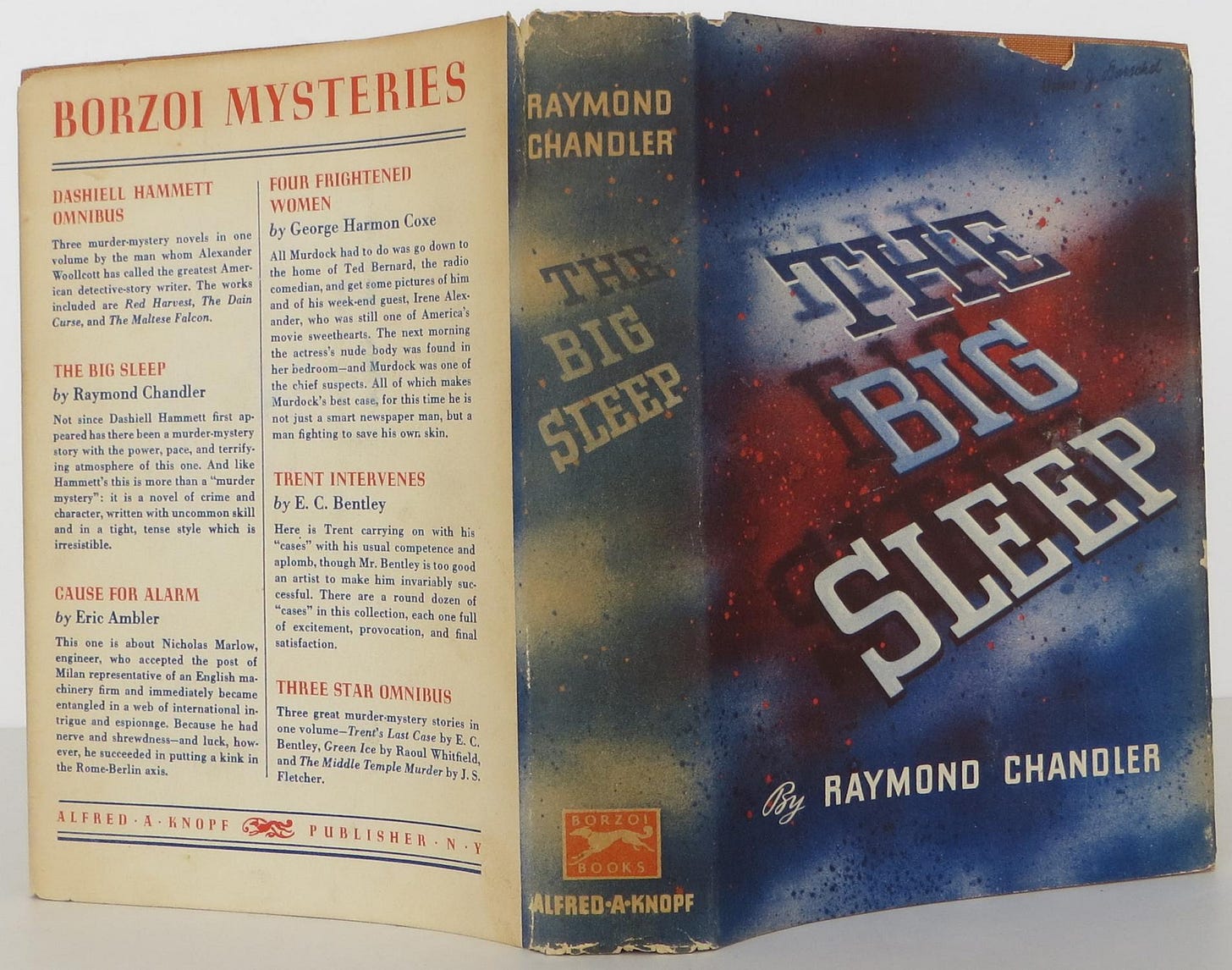Gentle reader,
When a whale dies in the open ocean, its corpse slowly sinks through darker and colder layers, before finally landing on the barren seafloor.
As decay sets in, a molecular message spreads with the tides: in death there is life, come feed.
After suffering through a blubbery chunk of the two week public corruption trial of Eric Garcetti’s Deputy Mayor and GM of LADBS Ray Chan, often as the only members of the press/public present, we are pained to report that such is the state of our beloved Los Angeles.
And unlike the sharks and octopi and worms and prawns and hagfish making a meal of a defunct cetacean, the organisms slurping down what’s left of Los Angeles are not useful members of a community ecosystem. They’re offshore criminal syndicates, drug addled political sellouts, cynical City Hall lifers, useless nepotism hires, parasitic lobbyists and the zombified remnant of a once great newspaper.
Nobody would miss them if, by some civic miracle, we woke up tomorrow morning to find they were all sucked down the drain.
Are you on social media? We’re on Instagram, Twitter, Facebook, YouTube, Mastodon, Threads, Bluesky, Substack Notes, TikTok and Reddit sharing preservation news as it happens.
We came home last Tuesday afternoon after closing arguments in Ray Chan’s trial, thinking we had a couple of days to dig through our notes and write about the tail end of the prosecution, which included some weird stuff. More on that below.
But something even weirder happened next: the jurors arrived at 8am on Wednesday, March 27 to resume their nascent deliberations, filled in the 24 page juror form, and sent it back to the judge at 9:15am. Moments after they were allowed to talk about the case, these twelve citizens found Ray Chan guilty on all 12 counts, with no apparent discussion of the lengthy trial or its 1000+ exhibits.
It happened so quickly, that there was no media in the courtroom, and no opportunity to ask departing jurors how they had arrived at such a swift decision.
And thus concluded—or so it seemed—the FBI’s nearly decade long public corruption investigations into Los Angeles City Hall. All that was left was Chan’s sentencing on June 10.
But on Thursday, March 28, the docket pinged with an unexpected alert: Judge John F. Walter had called a status conference and wanted Chan, his attorneys and the government’s team back in court at 8:00am Friday.
All of court watcher friends expressed surprise.
We wouldn’t have missed it for anything.
When we got to the Federal Courthouse, David Zahniser from the L.A. Times was going through the metal detector, and independent courts reporter Meghann Cuniff not far behind. She agreed the conference was strange, but it could be nothing.
Up on the 7th Floor, it felt like a dress rehearsal after all the drama of the full press Federal prosecution. No jurors and alternates, no back bench of shiny young deputy U.S. Attorneys observing their colleagues, no mysterious gaggle of tall Russian speakers in business casual, no friends of the defendant packing the room for moral support as they had during closing arguments, their cell phones blasting jaunty ringtones—just we four observers, the lawyers, lead FBI investigator Agent Andrew Civetti, the defendant and the young woman we believe is Chan’s daughter who had been always at his side. And at the front of the room, Judge Walter, his court reporter and courtroom deputy Shannon Reilly.
The judge got right to it. He didn’t expect to see everyone so soon, but an issue had arisen, due to a statement from a juror that was overheard by a courtroom deputy (CRD)—not Shannon.
This unidentified CRD was walking behind three jurors on Tuesday evening as they headed to the parking garage, and heard one say that they “hoped the jury would arrive at a quick verdict.”
The CRD heard nothing else, and could not tell which of the three said this. They knew, however, that one of the three was the jury foreman, because that juror had stepped into traffic and was pulled back by another juror who remarked that they would need a new foreman if this one got creamed!
A fourth member of the jury was walking behind the trio, and the CRD speculated this might have been because the others were talking about the case.
The CRD informed their colleague Shannon, and on Wednesday morning she brought the incident to Judge Walter’s attention. This must have been around the time the jury resumed deliberations.
Judge Walter said the remark had seemed to him innocuous after a long trial, so he didn’t raise it with counsel. His determination without speaking with them was that there had been no juror misconduct—and he still believed that—but now thought that it should be disclosed.
Chan’s attorneys asked for a moment, and stepped away from their client, behind the large screen monitor that during the trial had been illuminated with damning text messages and photographs of Jose Huizar and his co-conspirators partying in Las Vegas on Chinese developers’ tabs. Modulating his voice so only his co-counsel could hear, for about two minutes John Hanusz spoke intently to Michael G. Freedman, who stood arms crossed, nodding with brow furrowed.
Then Hanusz addressed the court. He thanked the judge for bringing this to their attention, and said that he understood his initial take was that there was no misconduct, but in light of the speed with which the jury returned, it raised an issue. He called attention to the bloated length of the trial, the more than 1000 exhibits. Maybe the jury had begun deliberating during the 15 minutes they were together after Tuesday’s closing arguments. He said he wanted to interview the jurors and would also make a move for a mistrial.
Judge Walter pooh poohed this. There was no evidence of outside influence. And calling the jurors back to be grilled by the defense seemed to be precluded by Federal Rule of Evidence 606(b). But go ahead, you may pursue a motion. And he urged the defense and prosecution to meet and get a briefing schedule so that this could be resolved quickly. He would look at their motion and the government response, and hold a hearing.
Hanusz asked Judge Walter for more details on what was heard outside the courtroom and what happened after. The judge said he interviewed the CRD on Thursday (one day after the verdict), and the CRD told him the story that Shannon had relayed previously.
Hanusz: We will be filing a motion, there’s no question of that.
Walter: I suspected as much. Just the quicker the better. Whenever you notice it for, I will do what I can to hear it on that day.
Here the judge spitballed a proposed schedule, a week to file, a week for the government to reply, which brought them to late April / early May.
Next Susan Har with the U.S. Attorney’s office spoke briefly, only to say she agreed with the court, this appeared not substantive, it had been a long trial and the jurors had had time to absorb the evidence.
Before sending the two sides on their way. Judge Walter noted he had already done some research into similar cases—he was speaking quickly, and cited what we heard as US vs Fayls and US vs Klee (see page 35)—the first unpublished, cases where there was no mistrial even though the jury had discussed the defendant’s guilt. He expressed concern about invading the privacy of the jurors’ deliberations. And when asked by Hanusz, he clarified that the foreman had been selected after closing arguments, before the overheard conversation.
The judge observed that the two other trials tied to the City Hall corruption investigation—Dae Yong “David” Lee and Shenzhen New World I—had also ended in quick convictions, and with no notes in the latter case. Despite two strong closings, the evidence appeared to him equally strong.
Judge Walter: Who knows what goes on in the jury room?
John Hanusz: Or outside the jury room!
As defense and prosecution conferred, settling on May 3 as a date that would work for everyone—assuming, that was, that Shannon didn’t decide that was the day she was visiting the Magic Kingdom, Judge Walter stepped down from the bench, called Agent Civetti over, congratulated him on a fine investigation and asked when he was returning to his post in Washington D.C. [update 4/8/2024: Ray Chan’s attorneys seek a mistrial or evidenciary hearing on the grounds of jury misconduct, to be discussed at the May 3 status conference.]
The parties poured towards the door, where defense attorney Freedman expressed relief that he had not yet sent all his suits to the dry cleaners. Kim stepped aside to let Ray Chan exit behind his lawyers—then was inspired to ask the burning question she’d been harboring through the entire trial…
But before that question, and Chan’s answer, let’s get back to the weird things heard on Monday during closing arguments, and some observations on the case as a whole.
It became clear over the prosecution, that the pandemic—or maybe the change in Presidential administrations—had thrown a wrench into the Feds’ prosecution of corruption in Los Angeles City Hall. After Jose Huizar was raided in November 2018, and arrested in June 2020, witness interviews stopped, and didn’t resume for a couple of years.
The case against Ray Chan was strong, but it was full of loose ends and failed to paint a complete or compelling picture of the City Hall racket. We heard a lot about interchangeable Chinese billionaires—men without personalities beyond enormous wealth and a desire to bribe local politicians to help turn their old hotels into new towers—but relatively little about how and why so many Angelenos were willing to accommodate their desires. Some of those who testified for the prosecution received only scraps in the way of bribe money.
There are people and entities that appear to have been deeply involved in the criminal conspiracy that are unaccountably not among those charged with crimes, nor those given the opportunity to cooperate and seek a deal. Most notable among these: senior staff of Los Angeles City Council President Herb Wesson, senior staff of Mayor Eric Garcetti, and the Chinese corporate owners of the bankrupt “graffiti towers” Oceanwide Plaza.
Wesson, remember, was instrumental in implementing the questionable redistricting scheme that gave Jose Huizar control over the lucrative Downtown Los Angeles development district that was his downfall. And none of Jose Huizar’s purchased PLUM votes were of any value until and unless Wesson scheduled them for a final vote in full City Council. Yet he figures in the case as just a shadow.
Nor did we hear anything about the means by which the corrupt projects got financed, and were profitable enough to allow for huge bribes: the Federal EB-5 visa program, trading $900,000 real estate investments for green cards. This was the juice behind the transformation of former councilmember Eric Garcetti’s Hollywood from a sleepy residential district of seniors, immigrants and the working poor to a wannabe Sunset Strip.
Garcetti himself appears in the welcome wagon video with former councilman Tom LaBonge (who illegally destroyed office records at the end of his term) and the principles of Relevant Group, the developers of the Selma Avenue party hotels that inspired a Congressional letter to the INS urging an investigation into Chinese funding and lack of required job creation.
The Federal prosecutions have ended, the INS has done nothing about Hollywood’s EB-5 district, and we have no reason to believe Los Angeles City Hall has ceased to be a place where votes are for sale and big real estate makes the rules. The Mayor’s office is actually in business with the fugitive billionaire Wei Huang, diverting millions to house homeless Angelenos at his L.A. Grand Hotel, a building that could be seized as the product of proven bribery under California’s Section 1090.
One promising development: after the Feds folded up their tent, the District Attorney brought his own public corruption case against Curren Price, who worked hand in glove with Jose Huizar on the powerful PLUM Committee, and whose wife Del Richardson displaced poor tenants in Hollywood to clear the way for luxury towers.
Then there are central figures whose voices were never heard: councilman Jose Huizar, of course, allowed to confess just before trial and sentenced to 13 years with no requirement that he cooperate or testify. Carmel Partners, the developer that got a slap on the wrist for admitting it bribed Huizar, and continues to erect huge towers in Herb Wesson’s district and Huizar’s CD14. And Ray Chan’s son and business partner, attorney Jeremy “Jerry” Chan, who was on the witness list and assisted with the defense in his first trial, but did not appear at all at this one, not even to provide courtroom support.
Also slated to appear in his own defense during his first trial was Ray Chan, with a proposed 30 hours on the stand. We never heard from him, either. In fact, there were no defense witnesses called at all, in a trial that threatens to send him away for his natural life. Weird.
Both defense and prosecution painted a one dimensional portrait: Chan was either a hardworking, preternaturally well-organized people pleaser doing the job Eric Garcetti trusted him to do (bringing foreign development to Downtown Los Angeles), or he was a criminal mastermind playing the lusty, greedy Huizar like a human fiddle for the benefit of foreign investors.
Maybe we’ll get a better sense of Chan’s actual personality in Steve Ongele’s forthcoming whistleblower retaliation trial, set to include Chan’s cutesy response when Ongele twice brought evidence of fraud against taxpayers to his supervisor: “Arrest Me!”
You can read some of Ongele’s court filings here.
Back to the trial that just ended: We couldn’t attend when former City Planning Commissioner David Ambroz testified, but after hearing how his time on the stand was recounted in closing defense arguments, we wish we could have.
At Chan’s first trial, before it ended in mistrial, Ambroz complained about being asked to meet the Deputy Mayor at the tacky cafe at Mama Shelter in Hollywood, where Chan acted like a real estate lobbyist and pressed for Ambroz to support the Luxe Hotel tower when it came up for a vote.
This time, though, something wild came out in cross examination, so wild that it was repeated in closing arguments to introduce the possibility of reasonable doubt.
The jury was reminded that only on one day of this lengthy trial, last Tuesday, had they heard from witnesses who were not facing years in prison if the government wasn’t happy with their testimony, or who were not government employees. Most of the case was made either by confessed criminals, or by FBI agent Andy Civetti.
Then there was one of those Tuesday witnesses, former City Planning Commissioner David Ambroz, who the defense suggested seemed to “have something against” Ray Chan, and had a wacky obsession with digital billboards killing people.
Had the jury found Ambroz believable? Remember, Ambroz hadn’t wanted to admit that he wore a wire (!!) to record the investigation’s original target (!!!) former City Planning Director Michael LoGrande (!!!!!!).
You’re not allowed to yell “holy cats!” or fall off your seat in a Federal courtroom, but if you were, we would have. Michael LoGrande has the distinction of receiving the largest individual City of Los Angeles ethics fine ever for his revolving door activities as a real estate lobbyist while still providing consulting services to City Hall, and recently scared the heck out of us with a show and tell of the illegally gutted Morrison Hotel downtown. When that happened, LoGrande was representing Relevant Group, the developer of the Hollywood party hotels under EB-5 scrutiny!
Why had David Ambroz worn a wire to record LoGrande in April 2019, just under two years after the awkward meeting with Ray Chan? Was Ambroz a whistleblower who volunteered to engage in amateur spycraft, or was he like everyone else recording conversations for the Feds: facing potential charges of his own?
What had happened to the FBI’s interest in Michael LoGrande—who was for a time in direct competition with defendant Ray Chan for the control of planning and development in Los Angeles, something that was halted through Overt Act 24 in the Grand Jury indictment of Chan and Jose Huizar? How had an investigation involving the City Planning Department, reporting directly to the Mayor, become a one focused on City Council’s PLUM Committee and its termed-out chair Huizar?
All interesting questions that are not the role of Ray Chan’s trial to answer. But how we wish somebody would.
As for David Ambroz, the following year, the longtime City Family team player started fritzing out. In July 2020, he stunned listeners to a City Planning hearing when he volunteered that Jose Huizar’s corruption offered an opportunity for the appointed commission to rewrite city planning rules to require affordable housing in high-rises.
The Planning Commission exists not to call out corruption or make public policy around affordable housing, but to implement the Mayor’s agenda by reviewing new projects and sending them on to City Council for final votes. Unsurprisingly, Ambroz would leave the Planning Commission before his term was up.
And as for his support for affordable housing policies, apparently it does not extend to being gracious when tenants fearing displacement protest his book talk with Mayor Karen Bass at Central Library.
We were pretty shocked by the David Ambroz wiretap bombshell, and wondered if we were the only reporters to realize what a big deal it was. Apparently, we were not. While working on this newsletter, the L.A. Times published a post-conviction case wrap up, in digital newsletter form, and revealed that reporter David Zahniser had tried to question Ambroz as he left the courtroom, and also sought comment from Michael LoGrande. Neither man responded.
We are troubled that the L.A. Times chooses to bury such serious headline news in an email blast, when real journalists would see it as headline news. But subscribers don’t get so see anything like:
GARCETTI APPOINTED PLANNING COMMISSIONER WORE WIRE TO SPY ON PLANNING DIRECTOR, RECIPIENT OF LA'S LARGEST ETHICS FINE
And this wasn’t the only jaw dropping bit of testimony revived in service of providing the jury with reasonable doubt.
There was also the matter of Agent Civetti, the FBI’s lead investigator, having wrongly stated that defendant Ray Chan had personally bribed Jose Huizar with festive red envelopes filled with U.S. currency, only to recant when pressed the next morning. His mea culpa, I misremembered, was plastered on the digital screen for much of the closing argument, a few feet away from Civetti himself.
None of it was enough to convince the jury, who had been marinating in incriminating text messages and recorded calls for two weeks. Hours later, three of them would let off a little steam on the way to the parking garage, oblivious to the officer of the court listening in. The following morning, they would convict on all counts and be free before lunchtime.
The Feds closed up their briefcases, ostensibly putting an end to years of work. And in Los Angeles City Hall, nothing much has changed at all. It’s still Chinatown, and the desires of developers still come before citizens and their quality of life.
Back to Friday’s status conference, where Kim had stepped aside to let the little guy who was so instrumental in wrecking the city she loves walk pass. She might never again have the chance to get the answer to the question that had been rattling around in her head, through all the testimony about Jose Huizar’s nasty habits and how the officious Ray Chan had facilitated purchase of his land use votes with casino trips, Katy Perry tickets, paid sex and fancy meals.
“Mr. Chan, can I ask you a question?”
“Talk to my lawyers!” he snapped.
Oh well then, guess we’ll never know which—if any—of the convicted City Hall racketeer’s almost namesake mystery novelist Raymond Chandler’s novels is his favorite!
But if we could guess, we’d say it was The Big Sleep, packed as it is with blackmail and worthless rich kids, gambling dens and all-day suckers, plot elements that never quite tie together and an abiding sense of melancholy for how, in yearning to connect, Angelenos somehow find themselves ever more alone, and the only escape is death.
“What did it matter where you lay once you were dead? In a dirty sump or in a marble tower on the top of a high hill? You were dead, you were sleeping the big sleep, you were not bothered by things like that. Oil and water were the same as wind and air to you. You just slept the big sleep, not caring about the nastiness of how you died or where you fell.” - Raymond Chandler, 1939
So it is for whales, and for once great cities, so long as the forces of greed and wickedness rule the day. One Deputy Mayor sunk, one fine functioning racket still chugging away. And two L.A. lovers step out of the courthouse and into the sunshine, still hopeful that this nightmare will end.
Saturday’s tour is a once a year special event, a celebration of the Bunker Hill writer John Fante’s 115th birthday, with cake, and personal tales of all redevelopment swept away from native son Gordon Pattison, and an opportunity to purchase a copy of Leslie Caldera’s limited edition artist’s book, The Vanished Built Environment Bunker Hill Los Angeles. Join us, do!
Yours for Los Angeles,
Kim & Richard
Esotouric
Psst… If you’d like to support our efforts to be the voice of places worth preserving, we have a tip jar and a subscriber edition of this newsletter, vintage Los Angeles webinars available to stream, in-person tours and a souvenir shop you can browse in. We’ve also got recommended reading bookshelves on Amazon and the Bookshop indie bookstore site. You can share this post to win subscriber perks. And did you know we offer private versions of our walking and bus tours for groups big or small? Or just share this link with other people who care.
UPCOMING BUS & WALKING TOURS
• John Fante’s Downtown Los Angeles Birthday (Sat. 4/6) • Raymond Chandler’s Noir Downtown (Sat. 4/13) • Human Sacrifice: The Black Dahlia, Elisa Lam, Heidi Planck & Skid Row Slasher Cases (Sat. 4/20) • Downtown Los Angeles is for Book Lovers (Sat. 4/27) • Alvarado Terrace & South Bonnie Brae Tract (Sat. 5/4) • Charles Bukowski’s Westlake (Sat. 5/11) • Hotel Horrors & Main Street Vice (Sat. 5/18) • Evergreen Cemetery, 1877 (Sat. 5/25) • POP – Preserving Our Past (Sat. 6/1) • Westlake Park (Sat. 6/8) • Highland Park Arroyo (Sat. 6/15) • Film Noir / Real Noir (Sat. 6/29) • Angelino Heights & Carroll Avenue (Sat. 7/13) • Know Your Downtown L.A.: Tunnels To Towers To The Dutch Chocolate Shop (7/27)












Thank you Kim and Richard. You really put in hard work with this article.
"But if we could guess, we’d say it was The Big Sleep, packed as it is with blackmail and worthless rich kids, gambling dens and all-day suckers, plot elements that never quite tie together and an abiding sense of melancholy for how, in yearning to connect, Angelenos somehow find themselves ever more alone, and the only escape is death." Genius.